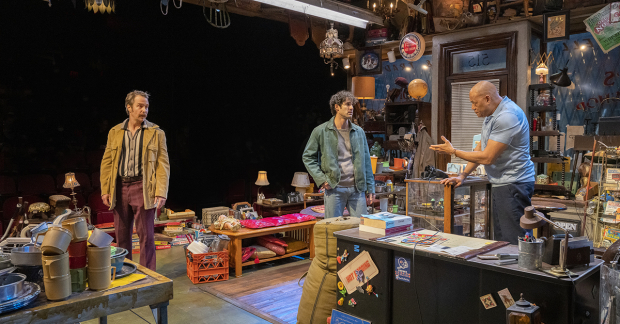Review: David Mamet's Low-Down Schemers Return in American Buffalo Revival

(© Richard Termine)
These days, David Mamet is known more for being a litmus test of one's ability to separate the art from the artist than for his actual art. His recent comments about teachers being "inclined…to pedophilia" is merely the latest of a string of inflammatory public pronouncements over the past few years. Based on the bilious reviews that greeted all of his more recent plays, including the Harvey Weinstein-inspired Bitter Wheat, off-Broadway's The Penitent, and Broadway's China Doll and The Anarchist, many critics seem to be down on his art as well. So, a new Broadway revival of one of his most famous plays, American Buffalo, can't help but feel just a tad out of step with current sociopolitical trends.
That may matter to some theatergoers more than others. Most of you reading this review will probably already have an idea whether you want to see the new all-star Broadway production at Circle in the Square. Either you're willing to put aside Mamet's offstage antics for the sake of seeing Laurence Fishburne, Sam Rockwell, and Darren Criss in the flesh, or you can't fathom giving Mamet any more of your hard-earned dough. I can only testify, then, to my own feelings while watching this revival: that there are genuine pleasures to be had in witnessing these three skilled performers verbally parry and thrust with each other under the guidance of a director, Neil Pepe, whose experience with bringing Mamet's distinctive vernacular to life onstage is everywhere evident.
Actually, there is a fourth star in this production: the set. Scenic designer Scott Pask's envisioning of the junk shop of Donny (Fishburne) — the arena in which he, his employee Bobby (Criss), and his friend Teach (Rockwell) hatch their scheme to steal back a buffalo nickel Donny previously sold to a customer for less money than it was worth — is breathtaking in the sheer level of detritus that's piled up onstage. Far from being just a whimsical visual choice, the deliberately crammed set is as much of an expression of the sheer waste of these characters' low-level aspirations and self-delusions as Mamet's own dialogue is.
Speaking of that dialogue, one of the chief delights of this revival lies in the palpable relish with which the cast attacks Mamet's lines, which have not lost any of their raw poetry in the intervening decades. Pepe has encouraged Fishburne, Rockwell, and Criss to deliver the dialogue with the brio of a fast-paced screwball comedy. There's so much pedal to the metal in their interactions that you may still feel your own pulse racing with the actors' rhythms even during the show's intermission.
Which is not to say that these actors shortchange the underlying pathos of their characters. Rockwell has the showier part as Teach, whose outward displays of street smarts masks a cluelessness at his core, and the actor plays his bluster for raucous comedy until he becomes terrifying when he resorts to physical violence in Act 2 (a feeling intensified by J. David Brimmer's genuinely unnerving fight direction). Donny may not be that much smarter than Teach, for all the worldly wisdom he offers to Bobby, but Fishburne nevertheless imbues Donny with dignity and gravitas, commanding attention even when he's simply witnessing Teach in one of his blowhard arias.
Criss, by comparison, comes off as somewhat one-note in putting across Bobby's well-meaning dimness, but the contrast his characterization offers to Donny's solidity and Teach's volatility nevertheless works in the context of this production. Costume designer Dede Ayite subtly emphasizes these character contrasts by giving Rockwell the most colorful shirts and jeans while keeping the attire worn by Fishburne and Criss relatively modest and humdrum.
The most noteworthy aspect of this revival is that it reminds us of what makes American Buffalo a formidable work in the first place. This is a down-in-the-dumps working-class vision of the American dream, and Mamet invites us to observe these oblivious, hypocritical dreamers with equal parts amusement, empathy, and skepticism. Whether this play has any fresh revelations to offer the more "woke" world of 2022, however, is a question that this production never really bothers to ask. For better or worse, this new production mostly offers the not-inconsiderable spectacle of a job well done.











